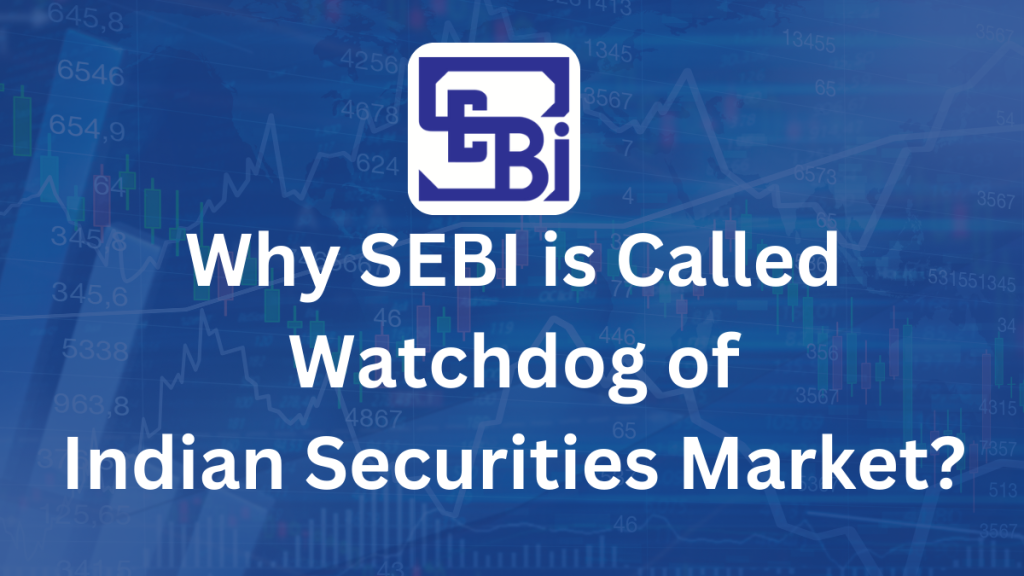The Securities and Exchange Board of India (SEBI) a regulatory body which plays a significant role in the Indian economy. It helps to protect the interests of financial investors. Along with that, it helps to maintain the integrity and security of the Indian securities market. SEBI was established in 1988 and since its establishment, it has played a very important role in the securities market. For one, it has helped bring about transparency in the securities market. Besides this, the securities market’s smooth functioning maintaining fairness, and efficiency can be credited to the establishment of SEBI. This blog aims to explore the reasons why SEBI is referred to as the watchdog of the Indian securities market, highlighting its major functions.

SEBI: Basic Details to Know
As mentioned earlier, SEBI is the regulatory authority for the Indian securities market. The organization was established in 1988 as an independent body. The main function of SEBI is to protect the interests of investors. Along with that, the organization also helps to promote healthy development of the securities market. SEBI’s regulatory authority began when the Securities and Exchange Board of India Act, 1992 was established. The main idea behind the act was to regulate the functions of different aspects of the securities market. As a regulatory authority, SEBI’s main job is to supervise the functioning of the securities market. It also helps to bring about some regulations so that SEBI can maintain its integrity. With ixamBee’s SEBI Grade A Online Course, hopefuls for the SEBI recruitment process can prepare for the exam diligently with the abundant resources provided for preparation.
List of Important Contribution By SEBI
You might be curious about the functions of SEBI. We have provided the list of important functions of SEBI:
Protecting Investors
One of the most important functions of SEBI is to protect the interests of investors. This means that SEBI makes sure that investors are provided with the right information regarding various companies and securities. Doing this allows them to make careful and wise investment decisions. Moreover, SEBI monitors the disclosure requirements for companies. This makes it important for them to provide detailed information about their operations, financial details, and risks involved. With this, investors will get access to all the important information they need before making investment decisions.
Along with that, SEBI also takes a lot of steps to stop the malpractices and fraudulent transactions in the market. Moreover, it conducts detailed investigations of trading and market manipulation as well as other violations of securities law. SEBI, in short helps to maintain the trustworthy nature and maintains the credibility of the securities market. They do this by taking stringent actions against those who conduct said malpractices and directly protects investors from scams and frauds.
Integrity of Market
Another important role of SEBI is in making sure that the integrity of the securities market is maintained. It helps in forming and enforcing some important rules and regulations. These regulations will help stop manipulation of the market, illegal activities and inside trading to name just a few. You should know that SEBI’s regulations help in bringing about healthier rivalry and more transparency to begin with. Along with that, it also helps regulate intermediaries in the securities market. These individuals are like brokers, depositories, and credit rating agencies. Bringing some regulations for intermediaries will bring about a more fair and transparent operation. By setting stringent norms and monitoring the activities of these intermediaries, SEBI safeguards the interests of investors and ensures that market participants adhere to ethical and professional standards.
Market Development
SEBI is not just focused on regulation and enforcement; it also plays a proactive role in developing the securities market. It constantly reviews and updates its rules and regulations to keep pace with changing market dynamics and international best practices. SEBI introduces reforms and initiatives to promote investor education, deepen the market, and enhance market infrastructure.
SEBI has introduced various measures to streamline the securities issuance process, such as the introduction of the online IPO application system and the use of depositories for holding securities in electronic form. These initiatives have made the process of investing in securities easier and more efficient, thereby attracting more investors to the market.
SEBI also supports the development of alternative investment options such as mutual funds, venture capital funds, and real estate investment trusts (REITs). By diversifying investment avenues, SEBI contributes to the growth and depth of the securities market.
International Recognition
SEBI’s regulatory framework and initiatives have brought international recognition to the Indian securities market. SEBI’s regulations are aligned with global standards and best practices, which has helped in attracting foreign investments into the Indian market. The regulatory framework of SEBI is well-regarded by international agencies and organizations, giving confidence to global investors about the integrity and stability of the Indian securities market.
4 Reasons SEBI is Called a Watchdog of the Indian Securities Market
Here are four major reasons why SEBI is also known as the watchdog of the Indian securities market.
I. Investor Protection:
One of the primary reasons why SEBI is called a watchdog is its commitment to protecting the interests of investors. SEBI has introduced various regulations and guidelines to ensure a transparent and fair market. For instance, it mandates that companies seeking to raise public funds must disclose all relevant information about their business, financials, and future prospects through a prospectus, enabling investors to make informed decisions. SEBI also regulates insider trading to prevent unfair advantage and protect investors from market manipulation.
Example: The Satyam Scandal
In 2009, the Satyam scandal shocked the Indian stock market, where the management of Satyam Computers manipulated financial statements to inflate profits. SEBI played a crucial role in investigating and punishing the individuals involved in the fraud. The regulatory actions taken by SEBI in this case showcased its role as a watchdog and its commitment to investor protection.
II. Market Surveillance:
SEBI acts as a vigilant guardian by monitoring the Indian securities market continuously. It aims to detect any market irregularities, manipulations, or prohibited activities, which could adversely impact the market’s integrity. By conducting market surveillance, SEBI ensures that the market operates in a fair and transparent manner, helping to maintain investor confidence.
Example: Banning Trading by Nirmal Kotecha
In 2011, SEBI banned reliance industries’ trader Nirmal Kotecha from the securities market for violating insider trading norms. SEBI’s proactive surveillance measures led to the identification of the market manipulation conducted by Kotecha. Such actions by SEBI reinforce its role as a watchdog, protecting the market from illicit activities.
III. Regulation of Intermediaries:
SEBI oversees various intermediaries in the securities market, such as stockbrokers, merchant bankers, depositories, and credit rating agencies. By formulating regulations and conducting periodic inspections, SEBI ensures that these intermediaries comply with the prescribed code of conduct, adhere to ethical practices, and operate in the best interests of investors and the market at large.
Example: Ban on Karvy Stock Broking Limited
In 2019, SEBI banned Karvy Stock Broking Limited from taking on new clients and executing trades due to allegations of misusing client’s securities. The action taken by SEBI highlighted its commitment to ensuring the accountability and reliability of intermediaries, thereby protecting the interest of investors.
IV. Promotion of Fair Market Practices
SEBI’s role extends beyond regulation; it actively promotes fair market practices by creating a level playing field for all participants. It continuously emphasizes the importance of corporate governance, advocating for companies to adopt transparent and ethical practices. Through various guidelines and regulations, SEBI encourages companies to maintain high standards of corporate governance, leading to increased investor confidence.
Example: Mandatory Disclosure Norms for Corporate Governance
SEBI introduced mandatory disclosure norms, such as the requirement to have independent directors on the board and to disclose executive remuneration. These norms aim to improve the transparency and accountability of companies, ensuring fair market practices and ultimately protecting the interests of shareholders.
The Securities and Exchange Board of India (SEBI) plays a vital role in safeguarding the interests of investors and maintaining the integrity of the Indian securities market. As a watchdog, SEBI ensures investor protection, conducts market surveillance, regulates intermediaries, and promotes fair market practices. Through its regulatory actions and initiatives, SEBI strives to create a transparent, efficient, and fair market ecosystem.
Conclusion
SEBI’s role as a watchdog of the Indian securities market is well-deserved due to its responsibility of protecting investors’ interests, maintaining market integrity, promoting market development, and garnering international recognition. With its vigilant oversight and robust regulatory framework, SEBI ensures the smooth functioning of the securities market and instills confidence in investors, making it an indispensable institution for the Indian financial system.
To help you prepare 50% faster for competitive exams, ixamBee provides a free Mock Test Series and all the Current Affairs in English and Current Affairs in Hindi in the BeePedia capsules for GA Preparation. You can also get the latest updates for Bank PO, Bank Clerk, SSC, RBI Grade B, NABARD, and Other Government Jobs.
Also Read
Comprehensive Discussion of Economic and Social Issues for NABARD Grade A Exam
Impact of Globalization on Agriculture
Old Pension Scheme Vs New Pension Scheme- A Comparison














